Feature
Ensuring Basic Human Rights
Realizing the Right to Access Reliable Information
Rapid Reports and Diverse Programs
Aiming for Reliable Public Broadcasting
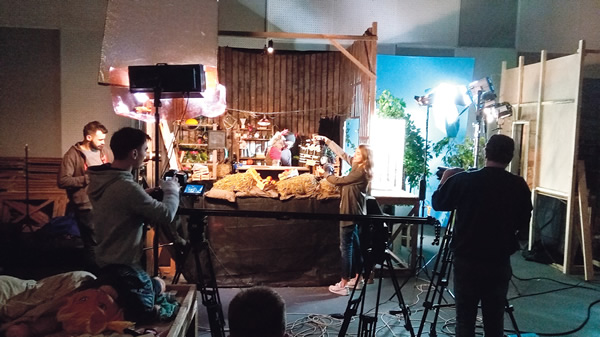
A scene showing the filming of the educational program Dodolyki.
Three years ago, a new public broadcasting station was established in Ukraine. A project is underway to protect the "right of people to know" accurate, impartial, and fair information.
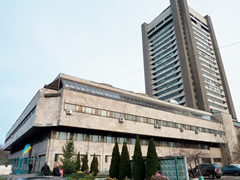
The headquarters exterior of the Public Broadcasting Company in Kyiv.

The puppets that appear in Dodolyki.
Protecting the Right of People to Know
The international community had pointed out that the major Ukrainian media were monopolized by a small number of financial conglomerates, and the flow of information tended to be biased towards their interests.
There is a pressing need to change this situation, because the "right of people to know" - to obtain accurate, impartial, and fair information - is not being adequately guaranteed. To this end, the Public Broadcasting Company of Ukraine (PBC) was established in 2017, based in the former complex of the National Television Company of Ukraine in the capital Kyiv. Simultaneously, 22 independent regional broadcasting stations were also incorporated into the PBC network.
However, most of the PBC staff, whether at the headquarters or regional stations, did not have sufficient understanding of public broadcasting.
Therefore JICA commissioned NHK International, with its wealth of knowledge as a part of public broadcasting in Japan, to start a project aimed at enhancing the abilities of Ukrainian staff and creating a system for public broadcasting.
Transformed Staff Awareness
There are three pillars to this project. The first pillar is developing a reporting system in the event of emergencies, such as disasters, major incidents and accidents that can have a significant impact on the people's lives. Covering and broadcasting over a wide area is essential for emergency broadcasting, and relies upon the smooth exchange of information between the regional stations and the headquarters. In order to create such a network, workshops are held on a regular basis with staff who are responsible for news in regional stations. These workshops cover issues such as how public broadcasting should appropriately report on elections.
The second pillar is the planning and production of programs that meet the diverse needs of the people, which is a mandate for public broadcasters. "We're making the first educational program in Ukraine targeting children, and another program which has a disabled person as the main character. These programs corroborate the need for public broadcasters." says Tsuchiya Masayuki, who provides program creation support. These programs do not have the highest ratings, and they fall under genres that have not yet been covered by private broadcasting. Dodolyki, a 12-episode puppet series, and Razom, a 16-episode disability documentary series, have already been aired. "These programs are made and watched by Ukrainians. All the more reason for us not to push our opinions and leave people to draw their own conclusions. People are so enthusiastic about making new things."
The third pillar is support in terms of the technology and equipment required to create high-quality programs. In many cases the equipment in the PBC headquarters and regional stations is old and not adequately maintained. The project therefore created a new equipment management system that enables them to access their equipment as needs arise.
In addition to these three pillars, the project is planning to create a staff handbook to summarize the know-how of program creation. It has already completed an emergency reporting handbook for both headquarters and regional stations. "The most significant change has been the staff's growing awareness of their role as journalists. I really feel their growing sense of calling and pride in their work as public broadcasters," says Miyao Atsushi, who is leading the project. With the help of Japan, journalists are today once again breaking new ground and are advancing journalism.
Hold Workshops
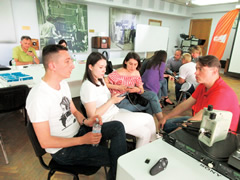
Staff engage in heated debates regarding themes such as public broadcasting and emergency reporting.
Produce Welfare Programs
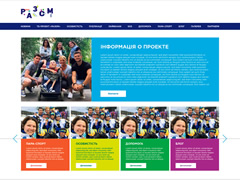
As the documentary series where the main character is disabled was so popular, a website was released.
Create a Staff Handbook
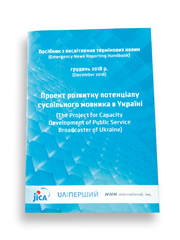
An emergency reporting handbook. It summarizes the actions and knowledge required from acquiring information to broadcasting.
Support Equipment Management
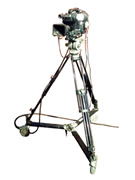
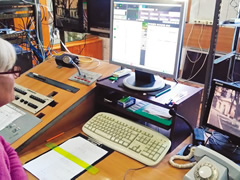
Much of the equipment in both the headquarters and regional stations is old. These are maintained while gradually being replaced with new equipment.
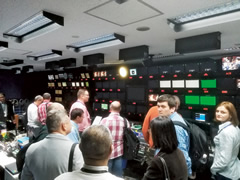
Staff observe the NHK studio and equipment room during training in Japan.




scroll